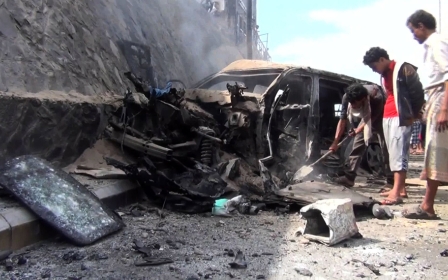Yemen truce begins with Swiss talks

The Saudi-led coalition said on Tuesday that a ceasefire in Yemen began this morning as warring parties prepared for UN-brokered peace talks in Switzerland.
The coalition, which launched an air campaign against the Houthi militia and its allies in March, said the ceasefire began at 0900 GMT following a request by Yemeni President Abd Rabbuh Mansour Hadi, but it warned that it "reserves the right to respond in case of any violation". The coalition had originally said that a ceasefire would start on Monday night.
Hadi has declared his government's intention to have a seven-day truce to coincide with talks opening in Switzerland and to be "renewed automatically if the other party commits to it," the statement said.
However, hours before the ceasefire took effect Yemeni security officials said pro-Hadi forces backed by Saudi-led air strikes took an island in the Red Sea from the Houthis, Saudi-owned al-Arabiya reported.
The truce announcement also came a day after the largely Arab coalition said a senior Saudi commander and an Emirati officer were killed during operations in Yemen.
A lull in fighting is sorely needed in the Arabian Peninsula's poorest nation, where an estimated 80 percent of the population requires humanitarian aid.
The Islamic State and al-Qaeda have exploited the violence, gaining ground and carrying out deadly attacks against both sides of the conflict.
The Houthi militiamen have yet to say if they will abide by the ceasefire agreement.
"We hope the militias will commit to the ceasefire this time," Mueen Abdulmalek, a member of the coalition-backed government's delegation at peace talks, said while referring to the Houthis.
A presidency official confirmed the truce was agreed by Hadi and Yemen's UN envoy Ismail Ould Cheikh Ahmed.
Yemen's conflict has pitted local forces backed by the Saudi-led coalition fighting in support of Hadi's government against the Shia Houthis and renegade troops still loyal to wealthy ex-president Ali Abdullah Saleh.
Previous UN efforts have failed to narrow differences, and past ceasefires were broken.
Top officers killed
Ahead of the ceasefire, Saudi Colonel Abdullah al-Sahyan and Emirati officer Sultan al-Kitbi died while supervising operations "to liberate" the southwestern Taiz province, the coalition said.
Yemen's presidency described them as "martyrs who died in an honourable battle" in a statement that also praised the coalition's role in supporting "Yemen's legitimate authority in regaining control of state institutions".
A Yemeni military source said they were killed when rebels fired a rocket at a coastal road in Taiz, which overlooks the strategic Bab al-Mandab Strait through which much of the world's maritime traffic passes.
Fierce fighting between the rebels and pro-Hadi forces continued on Monday in the southern Daleh province, witnesses said. Fierce bombing also hit Houthi positions south of Sanaa, witnesses said.
No word from Saleh
Both pro-Hadi forces and Houthi militiamen have traded barbs over each side's willingness to stick to the truce.
And there has been no word from Saleh or his General People's Congress party, which is represented at the Switzerland talks.
The warring sides have agreed to talks despite protracted differences, including over UN Security Council Resolution 2216, which calls for the Houthi militia to withdraw from key cities and surrender their weapons.
The government says the resolution is a prerequisite for peace.
According to the UN envoy, talks will focus on four main areas, including the terms of a permanent ceasefire and the withdrawal of armed groups from areas they control.
The Houthis seized government headquarters in Sanaa in September 2014, several months after advancing from their northern stronghold of Saada.
They later encroached on second city Aden, forcing Hadi into exile in Saudi Arabia in February.
In November, Hadi returned to Aden and declared it his provisional capital.
Under cover of coalition warplanes and backed by Arab soldiers and heavy weaponry, pro-government forces have recaptured five southern provinces, including Aden, since July.
The United Nations says more than 5,800 people have been killed in Yemen, about half of them civilians, and more than 27,000 wounded since March.
Stay informed with MEE's newsletters
Sign up to get the latest alerts, insights and analysis, starting with Turkey Unpacked
Middle East Eye delivers independent and unrivalled coverage and analysis of the Middle East, North Africa and beyond. To learn more about republishing this content and the associated fees, please fill out this form. More about MEE can be found here.





